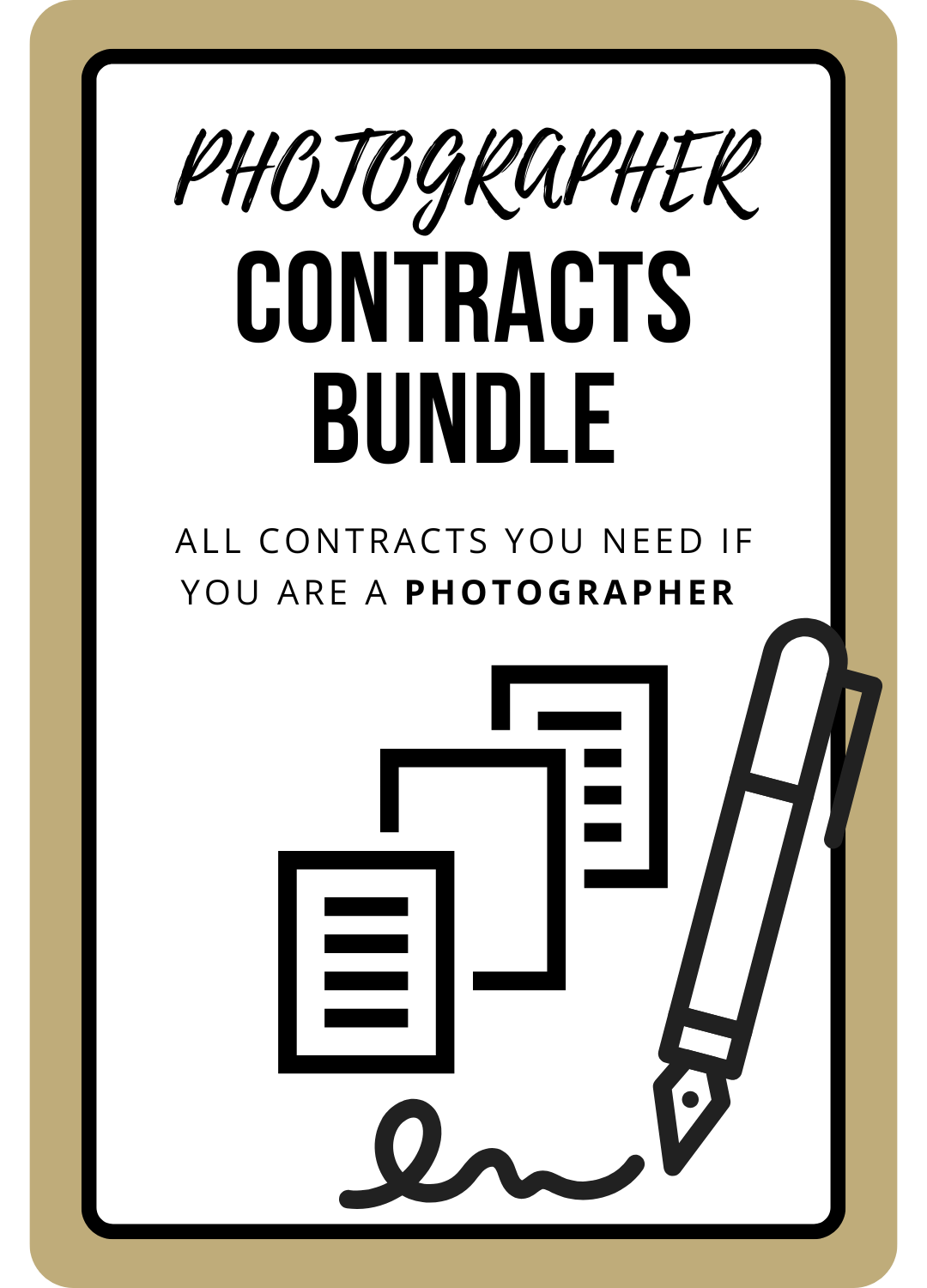Photographer Contracts 101: The 7 Legal Templates You Actually Need
Want to know what photographer contracts you need for your photography business? I’m sharing the 7 essential contracts you need to cover all your bases (beyond just your client contract).
As a lawyer for creative entrepreneurs, I’ve seen too many photographers left legally vulnerable — not because they weren’t serious about their business, but because they simply didn’t know what protections they needed. Whether you’re shooting weddings, portraits, brands, or even starting to sell your own digital products, the right photographer contracts can be the difference between a smooth, profitable project and a total legal mess.
In this post, I’ll walk you through the 7 photographer contracts that every photographer should have in place for each business level, including:
Your wedding, event, product, family, pet, or portrait photography contract for your clients
The media release form or model contract for photo shoot jobs that involve people other than the client
And everything else, from your website legal pages to testimonial release forms, and even terms for selling things like presets, prints, and photography courses
PLUS I’ll share the essentials you need in all your photographer contracts free of fluff!
You’ll learn what each contract is for, why it matters, and which photographer contracts are right for you — whether you’re just starting out or scaling up your studio into a digital empire.
This post is all about the essential photographer contracts for your photography business (level).
Essential Photographer Contracts
Your Guide to the Essential Photographer Contracts Free of Fluff
1️⃣ The Photography Contract: Your First Line of Defense
The most essential one of the photographer contracts is, of course, the photography contract. It’s what sets the terms and boundaries of your project and the relationship with your client. It also protects you when a client ghosts you, asks for a refund, or demands more edits than agreed. Yet many photographers either skip this step entirely or rely on generic contracts that don’t reflect how they actually work.
Without a proper photography contract, you risk:
Clients demanding refunds when they cancelled 2 hours before the shoot — because you didn’t have a solid cancellation policy in place
Endless revision loops because the editing process wasn’t clearly defined
Being liable for delays caused by bad weather, uncooperative guests, or unprepared clients —resulting in you not getting paid, or worse, you having to pay for their damages!
Legal disputes over who owns the photos and whether clients can use them in ads
Missing disclaimers for your specific niche — like pet accidents, guest interference at weddings, or access issues in real estate shoots
A well-drafted contract doesn’t just outline what’s included — it protects you from what can go wrong.
Here’s how the right contract keeps you covered:
✅ Sets clear scope, deliverables, and boundaries — so extras don’t eat into your time
✅ Defines the revisions included and what must be purchased as extra — no more endless editing
✅ Includes rescheduling and cancellation terms that protect your time and income
✅ Clarifies ownership and usage rights — so clients can’t repurpose your work without permission
✅ Includes niche-specific disclaimers — tailored protections for wedding chaos, pet unpredictability, location issues, and more
👉 Want to make sure every client shoot is protected from the start?
Get the Photography Contract or grab the Photographer Contracts Bundle to get all the essential photographer contracts you need in one.
2️⃣ Legal Website Pages: Because Your Website Needs Legal Protection Too
If you have a website — whether it’s for showcasing your portfolio, collecting inquiries, or building an email list — you’ll need to have certain legal pages in place. These aren’t just formalities (one of them is actually legally required); they protect you from real legal and financial risks.
Without proper legal pages on your website, you risk:
Fines for failing to disclose how you collect and use personal data (under privacy and data protection laws like GDPR, PIPEDA, CCPA, or other US State-specific laws)
Legal liability for any outdated or inaccurate advice shared in your blog or service descriptions
Copyright infringement disputes if someone reuses your content or images, and you didn’t set clear usage terms
Issues with platforms, affiliates, or ad networks if you don’t meet their legal compliance requirements
To stay compliant and protected, your website needs three essential legal pages:
✅ Privacy Policy — explains what personal data you collect (like names, emails, IP addresses), why you collect it, how it’s stored, and who it’s shared with. This is legally required almost everywhere, even if you’re just a one-person show who’s just starting out (and hasn’t made any money yet).
✅ Website Disclaimer — limits your liability for any content you share, especially if you offer tips, recommendations, or behind-the-scenes advice that someone could rely on to their detriment.
✅ Terms and Conditions — sets the ground rules for how visitors can interact with your site and protects your content, photos, and intellectual property from being misused.
My Legal Website Bundle includes all three of these essential legal pages — drafted specifically with creative businesses like yours in mind.
👉 Want to avoid fines and protect your content from the moment someone lands on your site?
Grab the Legal Website Bundle or get it as part of the Photographer Contracts Bundle — so you have all your bases covered, including your website.
3️⃣ Testimonial Release Form: Share Client Praise Without Legal Risk
Another essential legal document of the photographer contracts is the testimonial release form. Client testimonials are powerful — they boost trust, validate your work, and drive bookings. But sharing feedback, praise, or even just a client’s name without the proper right can backfire fast.
Without a proper testimonial release form, you risk:
Privacy complaints or takedown demands after sharing someone’s name, business, or feedback
Legal disputes over using a client’s quote, job title, or photo in your marketing
Damage to your credibility if a past client accuses you of using their testimonial without approval
Uncertainty over how and where you’re allowed to publish testimonials — especially in ads or paid promotions
A proper release form gives you full, legally binding permission — and peace of mind.
Here’s what the right form should do:
✅ Cover all types of contributors — whether it’s a client, student, podcast guest, or email subscriber
✅ Grant perpetual, worldwide, and non-revocable rights to use their testimonial, name, title, business name, and even headshot
✅ Allow use across all platforms — including your website, social media, sales pages, ads, email marketing, and podcast intros
✅ Waive personality, privacy, and publicity rights — so your rights can’t suddenly be revoked
✅ Eliminate the legal gray area — you know exactly what you can use, where, and for how long
My Testimonial Release Form includes all of this in one clean, easy-to-use document — so you can focus on showing off your best results, not second-guessing whether you’re allowed to.
👉 Want to safely showcase your client results and social proof?
Get the Testimonial Release Form or grab it as part of the Photographer Contracts Bundle, which includes all 3 legal templates we’ve just covered — and save BIG.
4️⃣ Media Release Form: Protect Yourself When Photographing Anyone
Even if your client signed your photography contract, that doesn’t give you automatic permission to use photos of every person in the frame. If you photograph anyone other than your direct client — like models, guests, event participants, or even people passing by — you’ll need a media release to legally use and publish those images yourself.
Without a signed media release form, you risk:
Legal claims from people featured in your photos who didn’t give you permission
Losing the right to use some of your best shots in your portfolio, blog, or social content
Privacy or publicity rights disputes if your photos appear in ads, promotional materials, or print
A photo release form protects your right to publish, license, and use the photos you’ve taken — regardless of who is in them.
A proper photo release form should:
✅ Be signed by every person featured in your photos who isn’t your direct client (or their parent/guardian, if a minor)
✅ Grant clear permission for you to use their likeness — including in promotional, editorial, or commercial content
✅ Allow you to publish, repost, or license the photos without needing extra approval later
✅ Protect you even if a participant changes their mind after the fact
My Media Release Form includes two versions — one for assignments and one for licenses — so you can choose how much control you need over the images.
👉 Photographing anyone other than your client?
Get the Media Release Form or grab the Photographer Contracts Pro Bundle — which includes this media release form and everything else from the Basic Bundle.
5️⃣ License Agreement: When You Need to Grant (or Sell) Usage Rights (Separately)
Your photography contract already defines how your client can use the photos you deliver — and prohibits any use beyond that.
But if someone wants to use your work in a new way or license photos you didn’t take for them, you need a separate license agreement that puts everything in writing (which makes it one of the most essential photographer contracts).
Without a proper license agreement, you risk:
Relying on vague email approvals or DMs that don’t hold up legally
Unclear boundaries about how your photos can be used, for how long, or in what formats
Not getting paid properly for extended usage because the payment terms were never documented
Disputes over what rights were (or weren’t) granted if the relationship turns sour
A license agreement clearly sets the terms — so you stay in control of your work, your usage rights, and your income.
A separate license agreement is essential when:
✅ A past or current client wants to use your photos in a way that wasn’t originally agreed upon in your contract
✅ A brand, publisher, or agency wants to license your existing work (like personal shoots or Instagram images)
✅ You want to charge for extended or commercial use — like paid ads, packaging, or national campaigns
✅ You want to retain copyright while granting only limited, revocable rights, under clear payment and usage terms
My License Agreement includes everything you need to safely license your photos — so your usage rights are clear, enforceable, and backed by contract.
👉 Want to license your work without losing control over it?
Get the License Agreement or grab it as part of the Photographer Contracts Pro Bundle, which includes all 5 legal templates we’ve just covered — and save BIG.
6️⃣ Terms & Conditions for Digital Products: Protect Your Presets, Printables & Downloads
Selling Lightroom presets, printable art, stock photos, or any downloadable digital product? Then one of the essential photographer contracts you need is a set of Terms & Conditions for Digital Products that apply at checkout.
Without the right digital terms, you risk:
Having your product files stolen, duplicated, or resold — without any real way to enforce your rights
Getting hit with refund demands or chargebacks — because you don’t have an enforceable refund policy in place (just stating “no refunds” on your sales page is not enough)
Being blamed for someone’s failed results — even though they misused or misunderstood your product
Strong, lawyer-drafted terms and conditions for digital products should be your first line of defense for digital product sales and:
✅ Prohibit sharing, reselling, and repurposing your downloads
✅ Let you set and enforce an enforceable no-refund policy (or a customized refund policy with clear limits if you do offer refunds under a “satisfaction guarantee”)
✅ Include solid disclaimers tailored to your niche
✅ Make your copyright ownership and license terms crystal clear — even across platforms
My Terms & Conditions for Digital Products include all of this — so you’re protected against misuse, refund abuse, and legal risk from day one.
👉 Selling digital products like presets, printables, or templates?
Get the Terms & Conditions for Digital Products or grab the All Access Bundle — so you have all the contracts you need for your multiple income streams.
7️⃣ Online Course Terms & Conditions: Set Boundaries and Protect Your Course Content
If you have made it to the level of your business where you sell educational content like workshops, masterclasses, or full-blown courses — whether they’re live, evergreen, or drip-released — the Terms and Conditions for Online Courses will be one of your essential photographer contracts.
Without proper course terms, you risk:
Students copying or reselling your videos, PDFs, or downloads — without any way to enforce your rights
Refund demands and chargebacks because you didn’t spell out your policy in an enforceable way
People blaming you for poor results when they didn’t complete the course or misapplied your teachings
Disruptive students ruining the experience for others — and no clear grounds to remove them
A strong set of terms & conditions for online courses puts you back in control — and protects your intellectual property, community, and income.
My Terms & Conditions for Online Courses include all of this:
✅ Solid license terms that prohibit copying, sharing, or reselling your content
✅ Disclaimers tailored to your niche
✅ Refund policy options that let you offer no refunds or a conditional guarantee — on your terms
✅ Clauses to protect you from liability if students don’t get results
✅ Rules for live sessions, group behavior, and misuse of the community
✅ Language to cover downloadable extras, bonus content, or limited-time access
👉 Selling online courses for photographers?
Get the Terms & Conditions for Online Courses — or grab the All Access Bundle — so you have all the contracts you need for your multiple income streams.
The Ultimate Photographer Contracts Template Bundles
Ready to protect your photography business from all angles?
Whether you’re just starting out or scaling into digital products and licensing, having the right legal templates in place isn’t optional — it’s how you protect your time, your creativity, and your income.
Here’s a quick recap of the 7 essential photographer contracts every photographer should have:
1️⃣ Photography Contract
2️⃣ Legal Website Pages (Privacy Policy, Disclaimer, Website T&Cs)
3️⃣ Testimonial Release Form
4️⃣ Media Release Form
5️⃣ License Agreement
6️⃣ Terms & Conditions for Digital Products
7️⃣ Terms & Conditions for Online Courses
📦 Just need the essentials?
Grab the Photographer Contracts – Basic Bundle
Includes: Photography Contract, Legal Website Bundle, and Testimonial Release Form
🚀 Want to license your photos or shoot more than just your client?
Grab the Photographer Contracts – Pro Bundle
Includes everything in Basic plus the Media Release Form and License Agreement
💡 Planning to sell presets, courses, or other digital products?
The All Access Bundle gives you every contract in the shop — so you’re fully protected as your business grows.
👉 Don’t wait until a refund demand or legal threat lands in your inbox.
Get the essential photographer contracts you need now, and feel confident knowing your photography business is protected from all angles.
This post was all about the essential photographer contracts for any level of photography business.
Other posts you may like:




